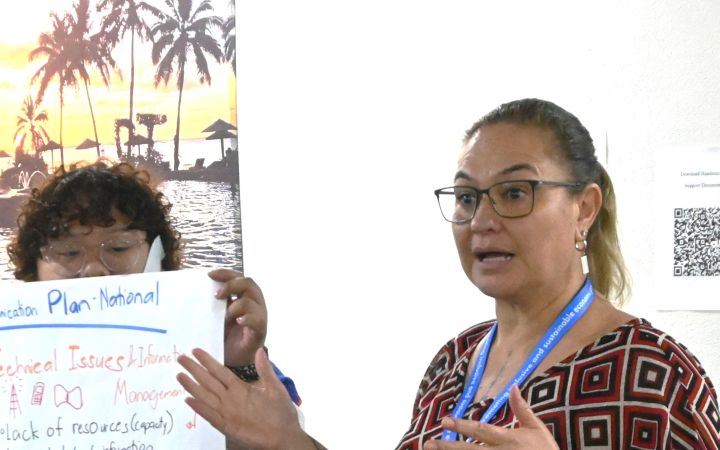- Margo Soltis is a New Zealand police officer seconded to the Fiji National Disaster Risk Management Office as a technical adviser to support its operational systems.
- Margo joined 2024 UNITAR Women’s Leadership in Tsunami-based Disaster Risk Reduction training, funded by the Government and People of Japan.
- Margo realized that if children know how to respond in a disaster, caregivers will not need to risk their lives to save them.
- Margo plans to promote children’s disaster preparedness education in Fiji and New Zealand.
5 November 2025, Hiroshima, Japan – When Margo Soltis, a police officer from New Zealand, joined UNITAR’s Hiroshima disaster risk reduction training, she did not expect to be so shaken by the disaster experiences of Japan. Neither did she expect to walk away with a new mission: to equip children with the knowledge and skills to respond confidently in emergencies.
When Disaster Strikes, Lessons Become Real
Margo was already an experienced police officer and leader in New Zealand when she was seconded to the Fiji National Disaster Risk Management Office as a technical adviser, to support and strengthen the Office’s operational systems. Coming from a background in policing and emergency management, Margo felt that she still had much to learn about disaster risk reduction. So she promptly took the opportunity to join the UNITAR training programme, especially with its focus on women’s leadership. Margo hoped to connect with other women leaders and share her own experiences while learning more about disaster risk reduction.
The UNITAR Women’s Leadership in Tsunami-based Disaster Risk Reduction Programme for World Tsunami Day, run by UNITAR Hiroshima Office with support from the Government and People of Japan, brought together women leaders from Asian and Pacific countries to build their skills in disaster risk reduction, climate resilience, and inclusive leadership. The 2024 programme was held in two phases, from September 2024 to March 2025. Margo was among the top 20 performers invited to Fiji for a regional workshop in the second phase. Through lectures, case studies, and interactive sessions, participants explored how to design strategies that reflect the realities of women, families, and people in vulnerable situations in their countries.
Teaching Children Can Save Women’s Lives
Margo was surprised by how much she was affected by the programme’s in-depth coverage of the 2011 Great East Japan Earthquake and Tsunami. She was struck by how women – who often take on caregiver roles – perish in disasters because they go back for family, for children.
But in the UNITAR programme, she saw that children could be active participants in the disaster response. Children can be taught evacuation routes and to alert others and act quickly when disasters strike. Margo realized: if children are prepared, women caregivers will not need to risk their lives to save them. It was something that had never crossed her mind.
I’ll die for my children, I’ll die for my parents, I would go back. But I never actually thought that if you educate [the children] and train them at a young age, you can be confident that they know how to look after themselves.
—Margo Soltis, police officer (New Zealand) and UNITAR alumna
Margo noticed that children’s disaster preparedness education is still limited in Fiji and was inspired to adapt lessons from the UNITAR training to make sure children know how to get to safety in emergencies while also giving parents greater confidence in their children’s preparedness.
Women Inspiring Women for a Safer Future
The UNITAR programme helped Margo see disaster preparedness in a new way. Promoting women’s safety, empowering children to act, and building community resilience to climate change can save lives and protect entire families. By investing in young people’s awareness and encouraging women’s leadership, she believes entire communities can face the future with greater strength.
Margo plans to put these lessons into action in Fiji and, when her term in Fiji is complete, in New Zealand. She encourages other women leaders to support each other and use their potential to inspire change.
My message … is to bring up other women with [you]. Don’t leave them behind. Pull them up and push them ahead if you can see potential, because if they go further than you, then you have contributed to that. Always take as many women with you. … encourage and inspire them to be the best people that they can be.
UN Volunteer Maria Luna Oros Nelli contributed to this article.
About UNITAR
The United Nations Institute for Training and Research (UNITAR) is a dedicated training arm of the United Nations. In 2024, UNITAR trained approximately 550,000 learners around the world to support their actions for a better future. UNITAR has a global presence, with offices in Geneva, Hiroshima, New York and Bonn and networks around the world. Find out more at unitar.org


